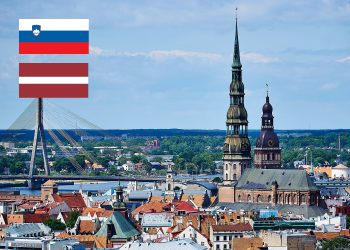Latvia and Slovenia implement newly amended trademark legislation

The intellectual property offices of Latvia and Slovenia have recently implemented amendments to their trademark legislation. The changes to the Latvian trademark law entered into effect as of March 6, 2020, whilst the newly altered Slovenian trademark legislation was implemented on March 29, 2020.
Alongside other EU member states, both Latvia and Slovenia have altered their trademark law in line with EU directive 2015/2436, which is set to harmonise trademark systems throughout the European Union.
Among the most significant amendments to the trademark law of both countries is the abolition of the graphical requirement for the representation of a mark. Marks may now be represented in alternative forms which were not previously allowed, including 3-dimensional, multimedia, holographic, motion or sound representations. The same has been similarly implemented across the EU, allowing the registration of non-traditional marks not permitted in some member states previously.
Latvia
The new Latvian trademark law has replaced the previously in force Law on Trademarks and Geographical Indications of 1999 bringing it in line with the trademark legislation of the European Union. The alterations in Latvia span several areas of trademark law, introducing new types of marks and amending regulations.
Among such changes, the new law will now allow for certification marks, not available in Latvia previously, to be registered, as well as new types of trademarks - multimedia, holographic, etc.
The scope of protection of trademarks was extended to instances of the use of undistinguishable signs in the course of business, even if unrelated directly to particular goods or services but still capable of harming the distinctive character of the mark or taking unfair advantage of its reputation.
Further, the definition of parties able to acquire trademark rights and assume the subsequent legal obligations has been extended to include not just natural or legal persons as previously available, but also their associations capable of acquiring rights and obligation.
With regard to opposition proceedings, the period for response to opposition against an international registration has been reduced from three months to two months.
Slovenia
In addition to the abolition of the requirement of graphical representation, the newly altered legislation has redefined the absolute grounds for refusal. Earlier national or EU-wide geographical indications, protected designations of origin and traditional names for wines are now considered to be absolute grounds for refusal.
The updated legislation also provides a more concise definition for an earlier trademark in the opposition proceedings. In particular, if the opposition is grounded on a trademark application with an earlier filing (priority) date, it must have matured to registration in order to be considered as a basis for refusal on relative grounds.
The amendments to both Slovenian and Latvian trademark law are in line with ongoing European efforts to harmonise IP law across Europe. With clearer definitions and a wider scope of creative possibilities in relation to the representation of a trademark, it is hoped that further applicants will file for protection of their trademarks.